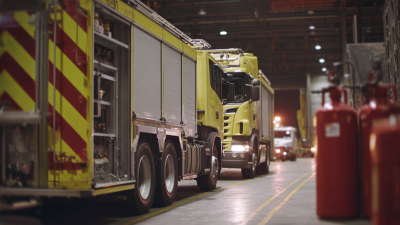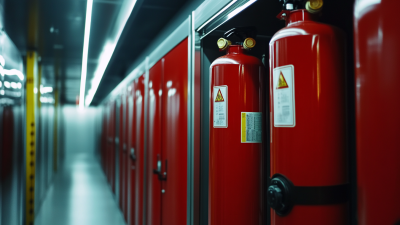5 Key Reasons Your Fire Apparatus Needs Regular Maintenance
Regular maintenance of fire apparatus is crucial for ensuring the safety and efficacy of fire response operations. According to the National Fire Protection Association (NFPA), fire departments in the U.S. responded to approximately 1.3 million fires in 2020 alone, highlighting the necessity for their equipment to function flawlessly during emergencies. A study from the Fire Apparatus Manufacturers Association (FAMA) indicates that proper maintenance can reduce equipment failure by up to 20%, which is vital given the high stakes involved in fire response. Furthermore, maintaining fire apparatus not only prolongs the lifespan of these critical vehicles but also ensures compliance with safety standards, ultimately saving lives and property.

In this blog, we will explore five key reasons why your fire apparatus requires regular maintenance, emphasizing the importance of reliability and preparedness in fire service operations.
The Critical Role of Regular Maintenance in Fire Apparatus Performance
 Regular maintenance is essential for fire apparatus performance, ensuring that these critical vehicles are always ready to respond during emergencies. Fire trucks and other apparatus experience heavy use and can face extreme conditions. Routine checks and servicing help identify potential issues before they escalate into serious problems, thus enhancing the reliability of the equipment during critical operations. By adhering to a structured maintenance schedule, fire departments can ensure that every component, from hydraulic systems to communication devices, is functioning optimally.
Regular maintenance is essential for fire apparatus performance, ensuring that these critical vehicles are always ready to respond during emergencies. Fire trucks and other apparatus experience heavy use and can face extreme conditions. Routine checks and servicing help identify potential issues before they escalate into serious problems, thus enhancing the reliability of the equipment during critical operations. By adhering to a structured maintenance schedule, fire departments can ensure that every component, from hydraulic systems to communication devices, is functioning optimally.
Moreover, regular maintenance plays a crucial role in extending the lifespan of fire apparatus. Just as with any other vehicle, neglecting routine checks can lead to accelerated wear and tear, resulting in costly repairs or even replacements. Investing time and resources into maintenance not only promotes efficiency but also safeguards the lives of firefighters and the communities they serve. A well-maintained apparatus reflects a commitment to safety and preparedness, which is vital in the face of ever-evolving challenges in fire service.
Identifying Potential Hazards: The Importance of Early Detection
Regular maintenance of fire apparatus is not just beneficial; it is vital for ensuring safety and reliability in emergency situations. Identifying potential hazards through early detection can significantly mitigate risks. Recent reports highlight that fire incidents, like the catastrophic gas explosion in Malaysia, reveal the devastating consequences of neglecting safety protocols. The explosion, which sent flames soaring 20 meters high and reached temperatures near 1200 degrees Celsius, underscores the critical need for consistent equipment checks and preventive measures.
Data indicates that well-maintained fire fleets can enhance response times and operational efficiency. For instance, fire departments that adhere to a strict maintenance schedule report up to a 30% reduction in equipment failure during emergencies. Moreover, integrating technology, such as smart fire alarm systems, provides real-time monitoring and early detection capabilities that can alert teams before a minor issue escalates into a major crisis. This proactive approach not only saves lives but also protects property and resources from the devastating effects of fire outbreaks.
5 Key Reasons Your Fire Apparatus Needs Regular Maintenance - Identifying Potential Hazards: The Importance of Early Detection
| Reason | Description | Potential Hazards Identified | Frequency of Maintenance |
|---|---|---|---|
| Ensures Operational Readiness | Regular maintenance checks ensure that the fire apparatus is fully operational during emergencies. | Malfunctioning equipment, inadequate water supply, faulty alarms | Monthly |
| Identifies Wear and Tear | Regular inspections help to identify worn components before they fail. | Brake failure, leaks in hoses, worn-out tires | Quarterly |
| Enhances Safety Standards | Maintaining apparatus helps comply with safety regulations and avoid penalties. | Deterioration of safety equipment, failed inspections | Annually |
| Increases Lifespan of Equipment | Proper maintenance can prolong the life of the fire apparatus and its components. | Early component failure, costly replacements | Bi-annual |
| Cost Efficiency | Preventative maintenance is often more cost-effective than emergency repairs. | Unforeseen repair costs, budget overruns | As required |
Maximizing Lifespan: How Maintenance Extends Equipment Durability
 Regular maintenance is crucial for fire apparatus to maximize its lifespan and ensure reliability when it's needed most. Just as advancements in technology are transforming maintenance in sectors like copper mining and offshore energy, fire apparatus also benefits from innovative strategies. Implementing condition-based maintenance techniques, similar to those used in predictive AI and IoT for mining equipment, can significantly enhance the operational efficiency and longevity of firefighting vehicles. These strategies not only help avoid unexpected downtimes but also facilitate timely repairs, ensuring that the apparatus remains ready for emergencies.
Regular maintenance is crucial for fire apparatus to maximize its lifespan and ensure reliability when it's needed most. Just as advancements in technology are transforming maintenance in sectors like copper mining and offshore energy, fire apparatus also benefits from innovative strategies. Implementing condition-based maintenance techniques, similar to those used in predictive AI and IoT for mining equipment, can significantly enhance the operational efficiency and longevity of firefighting vehicles. These strategies not only help avoid unexpected downtimes but also facilitate timely repairs, ensuring that the apparatus remains ready for emergencies.
Moreover, the focus on sustainable maintenance practices seen in other industries is equally applicable to fire equipment management. Utilizing advanced monitoring systems can provide real-time insights into the condition of the apparatus, allowing for proactive upkeep that extends its durability. Just as specific coatings for offshore energy infrastructures can prolong asset life, incorporating tailored maintenance schedules and techniques for fire apparatus can lead to remarkable improvements in their operational lifespan. Embracing these approaches will ultimately strengthen the preparedness of firefighting services while safeguarding their essential duties.
Ensuring Compliance: Meeting Safety Standards Through Regular Checks
Regular maintenance of fire apparatus is crucial not only for operational efficiency but also for ensuring compliance with safety standards. Fire apparatus must meet specific legal and safety regulations, similar to other industries where compliance checks are vital, such as food safety and transportation. For example, the US Department of Transportation has heightened oversight on railroad bridge safety, emphasizing the importance of adhering to safety protocols. Just as inspectors are trained to monitor compliance in transportation, fire service personnel must conduct systematic checks to verify that their equipment meets regulatory requirements.
In addition to meeting legal obligations, regular maintenance of fire apparatus can significantly mitigate risks associated with fires and enhance community safety. A report from the National Fire Protection Association indicates that nearly 30% of fire-related incidents arise from equipment failure, underscoring the need for consistent inspections and maintenance. This proactive approach not only fortifies safety but also builds public trust in fire services. Just as compliance in other sectors, like health and safety in cold chain logistics, is critical for operational integrity, the regular maintenance of fire apparatus ensures that teams are prepared, capable, and compliant with the latest safety regulations.
Cost-Effectiveness of Proactive Maintenance for Fire Departments
Regular maintenance of fire apparatus is not just a best practice; it is a cost-effective strategy that can significantly benefit fire departments. By conducting proactive maintenance, departments can identify and resolve issues before they escalate into costly repairs or replacements. This preventative approach helps in extending the lifespan of equipment, ensuring that each piece of apparatus operates at peak efficiency during critical moments. The financial savings from avoiding major malfunctions translate into more budget-friendly operations and resource allocation.
Moreover, proactive maintenance enhances the safety of both firefighters and the community they serve. Well-maintained equipment reduces the risk of breakdowns during emergencies, which can lead to dire consequences. By investing in regular inspections and routine upkeep, fire departments not only safeguard their personnel but also build trust within the community. Citizens are more likely to feel secure knowing that their fire services are equipped and maintained to handle emergencies effectively, ultimately supporting a more resilient and prepared community.
Related Posts
-

Exploring Global Opportunities at the 137th Canton Fair for Fire Apparatus Buyers
-

Navigating International Trade Certifications for the Best Fire Apparatus in a Global Market
-

Revolutionizing Global Fire Safety with China's Best Quality Manufacturing
-

Unique Styles of Fire Extinguishers That Excel in Equipment Protection
-

Real-World Applications of the Best Fire Equipment for Global Safety Standards
-

Unmatched Manufacturing Excellence from China's Leading Factory for Best Extinguisher Cabinets
